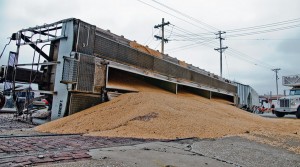 Trains are usually a pretty safe and reliable way to ship freight (and people), but, sometimes, those trains can have problems and jump the tracks. When a train derailment happens, the first order of business is to get the track cleared and repaired so they can keep the main line open. After that, it’s up to big equipment and trucks to clean up the mess. Trains may be able to haul more freight than trucks in one big line of cars, but they are still dependent on trucks – especially after a derailment or other accident.
Trains are usually a pretty safe and reliable way to ship freight (and people), but, sometimes, those trains can have problems and jump the tracks. When a train derailment happens, the first order of business is to get the track cleared and repaired so they can keep the main line open. After that, it’s up to big equipment and trucks to clean up the mess. Trains may be able to haul more freight than trucks in one big line of cars, but they are still dependent on trucks – especially after a derailment or other accident.
Train derailments happen a lot more often than you might think. While researching for this article, I found a website that stated that some type of derailment accident happens every six hours in the United States. Financial losses from these derailments, not to mention environmental losses, total in the hundreds of millions of dollars every year. The main cause of derailments is track problems, followed by human error, and then problems with the rolling stock (the trains and cars themselves). Many of these “accidents” are just minor mishaps, but, sometimes, a full-on train tragedy occurs and several cars leave the tracks, causing damage and destruction wherever they happen to fall.
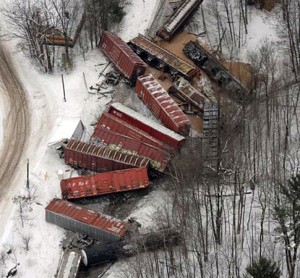 Where a derailment happens really plays a big part in the clean up process. Many places aren’t near any roads so it is hard to get the necessary equipment to the scene to clean up the mangled mess. In remote places, sometimes the only way to get equipment in and out is to drag it with a bigger piece of equipment. Talking with fellow 10-4 writer (and now truck driver) Troy Miller, he told me about working his first derailment job and the challenges he faced while hauling out 24 wrecked coal hopper rail cars for his employer S/D Enterprises.
Where a derailment happens really plays a big part in the clean up process. Many places aren’t near any roads so it is hard to get the necessary equipment to the scene to clean up the mangled mess. In remote places, sometimes the only way to get equipment in and out is to drag it with a bigger piece of equipment. Talking with fellow 10-4 writer (and now truck driver) Troy Miller, he told me about working his first derailment job and the challenges he faced while hauling out 24 wrecked coal hopper rail cars for his employer S/D Enterprises.
Steve and Jimmie Disher, brothers from Commerce City, Colorado, each have their own company, and when they aren’t hauling oversize loads they help clean up train derailments. One of the challenges they faced when cleaning up this derailment was that they were not able to use a torch to cut pieces off the coal cars before they were loaded. Then, once a car was loaded on the step-deck, Troy had to make sure that everything was securely strapped down before leaving for the scrap yard, which was no easy task. Troy typically used eight chains to tie down each wrecked car.
Most freight train cars, with just a few exceptions, are made out of steel. Once they leave the tracks, even if they might be repairable, they are usually just scrapped. The cost of transporting wrecked rail cars, along with the needed oversize permits, makes it too expensive to even try to save them. The smashed, or sometimes just dented, rail cars are taken to the nearest scrap yard where they are cut up and recycled.
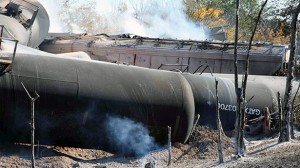 One day, after a rain which turned the job site into a muddy mess, the guys were forced to drag the trucks through the mud to the derailment site with an excavator. Not only are these working conditions not fun, but they can also be dangerous, making safety even more important. At this particular job site, there was an assortment of equipment including two excavators, one dozer, one crane, one crane with a bucket, and an assortment of lowboys, double-drops, and flatbeds. They tried to salvage as much of the coal as possible, but most of it was contaminated with dirt.
One day, after a rain which turned the job site into a muddy mess, the guys were forced to drag the trucks through the mud to the derailment site with an excavator. Not only are these working conditions not fun, but they can also be dangerous, making safety even more important. At this particular job site, there was an assortment of equipment including two excavators, one dozer, one crane, one crane with a bucket, and an assortment of lowboys, double-drops, and flatbeds. They tried to salvage as much of the coal as possible, but most of it was contaminated with dirt.
Wearing the required safety gear and equipment can get hot – especially in the brutal heat of summer. Troy doesn’t need to worry about dieting to keep his weight down – it’s been so hot and he’s been working so hard, he’s already lost 20 pounds on this job. When Troy told me the one thing he was always on the lookout for (but thankfully didn’t see) was rattlesnakes, I told him that the first time I saw one those would have been the end of me going back for another load! I do not like rattlesnakes!!
It’s been 35 years since I worked in the office after school my senior year for a little company in Atkins, Iowa called West Side Grain & Salvage Inc. At the time, I worked in the owner’s home office on their family farm. Back in those days, they had some straight trucks, grain trailers and a few trucks capable of “vacuuming” grain off the ground, out of elevators, or out of overturned rail cars.
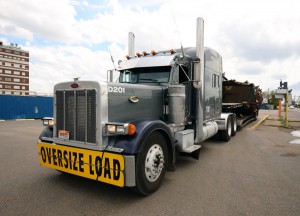 Today, that “little” company, now known as West Side Unlimited Corp, has evolved into several large businesses, including West Side Transport, West Side Salvage, and West Side Grain Sales. Together, the West Side companies now employ more than 525 people throughout the United States. I think it is pretty cool that their headquarters is still located just across the street from the farm house where I used to work, where it all began nearly 50 years ago. Dale Vogt started this business with just a pickup truck and a grain shovel, salvaging small amounts of grain. Over the years, his oldest son Don and his brothers have helped the company to grow in a big way.
Today, that “little” company, now known as West Side Unlimited Corp, has evolved into several large businesses, including West Side Transport, West Side Salvage, and West Side Grain Sales. Together, the West Side companies now employ more than 525 people throughout the United States. I think it is pretty cool that their headquarters is still located just across the street from the farm house where I used to work, where it all began nearly 50 years ago. Dale Vogt started this business with just a pickup truck and a grain shovel, salvaging small amounts of grain. Over the years, his oldest son Don and his brothers have helped the company to grow in a big way.
Back in the day when I worked there, my brother Paul Wiley worked alongside Don, Lonnie and Jon Vogt on several derailment jobs, running what they called “vacu-vators” – huge vacuums that would suck grain on to rail cars or trailers to haul it away from derailments or elevator fires. At that time, their father Dale was starting to slow down and give more work to the boys as they were getting old enough to do it. It was a pretty relaxed place to work, with Jeanne running the office and Dalean, about five years old at the time, running around.
My brother Paul told me about one derailment he worked in the winter sometime during the late 1970’s near Dubuque, Iowa. When the cars went off the track, they crashed down a steep embankment and ended up on the frozen Mississippi River. The only way they could even get to the site was to take the rail vac (a vacuum truck equipped with rail wheels) down the track close to where the derailment occurred. Then, the snow was plowed off the ice, making a road of sorts, and the trucks pulling grain trailers were sent out on the ice to load (this was the only way to get the trailers close enough to load them). Paul remembers hearing the ice crack as the trucks drove out there, but none of them fell through and they got the job done.
Paul told me about another train wreck near Dubuque that ended up with about five cars in the river. This time it was in the summer. They had to 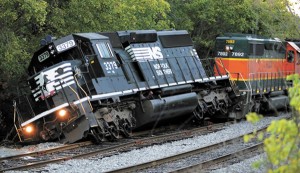 drag the cars as close as possible to the shore, tie them off, and then vacuum the corn (and water) out of the hopper cars as they were floating in the river. The truck vac was capable of pulling up to three cars at a time, and on this job, they had to crack the hopper bottoms on the cars they were loading to let the water drain out. As you can imagine, they were pumping a lot more water than corn. But, like all their other jobs, they cleaned it up and did what it took to get the job done right.
drag the cars as close as possible to the shore, tie them off, and then vacuum the corn (and water) out of the hopper cars as they were floating in the river. The truck vac was capable of pulling up to three cars at a time, and on this job, they had to crack the hopper bottoms on the cars they were loading to let the water drain out. As you can imagine, they were pumping a lot more water than corn. But, like all their other jobs, they cleaned it up and did what it took to get the job done right.
West Side can do jobs as small as a single rail car on-site transfer, on up to the really big jobs, like a 30-car general freight derailment. Their remarkable growth can be attributed to extensive employee training and attention to safety, along with using the best equipment. These sound business practices have made West Side Unlimited one of the largest, most diversified, well-equipped and respected salvage operations in the United States – and beyond. Each of the divisions work together and compliment one another to get those really big jobs done. Having the different divisions can really help in those time-sensitive situations. Not having to rely on another carrier to be there, with the necessary equipment, can really make a difference when saving time matters.
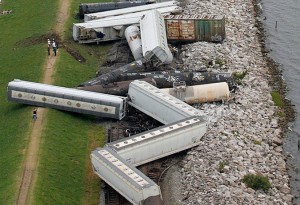 Available 24 hours a day, 7 days a week, and 365 days a year, West Side Salvage offers emergency mobilization within the hour. I can remember when they would get a call back in the early days – phone calls were quickly made, and men were heading out the door to get a job started faster than I could ever believe. This business can’t wait until tomorrow – it has to get started now! West Side is a one-stop shop from start to clean up and site restoration. Even back when I worked there, the motto was to always leave a site cleaner than when they got there. And in today’s world, this is more important than ever.
Available 24 hours a day, 7 days a week, and 365 days a year, West Side Salvage offers emergency mobilization within the hour. I can remember when they would get a call back in the early days – phone calls were quickly made, and men were heading out the door to get a job started faster than I could ever believe. This business can’t wait until tomorrow – it has to get started now! West Side is a one-stop shop from start to clean up and site restoration. Even back when I worked there, the motto was to always leave a site cleaner than when they got there. And in today’s world, this is more important than ever.
If your company would ever need the special services that West Side Salvage offers, or if you just want to learn more about them, call them at (800) 747-0104 or check out their website (www.westsideunlimited.com) to see everything they have to offer when it comes to your salvage or trucking needs. Knowing this company like I do, I can say with certainty that not only can they can handle your job, but that they will treat you right, as well. Let’s just hope you never need their services!
